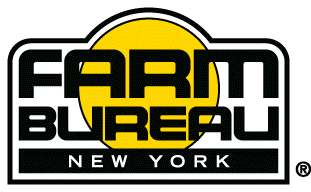
Press conference held to highlight Senate events on Farm Labor Bill and the bill’s impacts
New York Farm Bureau members spoke today about the positive work happening on their farms to support their employees and the need to have a viable farm economy. They also voiced concerns about the expected financial impacts of the Farmworker Fair Labor Practices Act (S. 2837/A. 2750) proposed in the state Legislature. They shared their thoughts during a press conference today at Pastureland Dairy, LLC, Manlius.
This event is in advance of an important opportunity to speak directly to lawmakers who will be voting on legislation that could profoundly affect New York agriculture. Senator Rachel May (D-Syracuse), Senate Agriculture Committee Chair Jen Metzger (D-Rosendale) and the chair of the Senate Labor Committee and the bill’s sponsor, Senator Jessica Ramos (D-Queens), will hold a Senate Hearing on the bill this Thursday at SUNY Morrisville. Two additional hearings will be held April 26 on Long Island and May 2 at SUNY Sullivan. Many farmers and their employees have signed up to testify to share their stories at these events.
The farmers are welcoming Senator Ramos to Central New York and appreciate her taking time to speak with their fellow farmers and valued employees. Beginning late last year, New York Farm Bureau encouraged downstate lawmakers to hold upstate events on this issue. It is imperative urban lawmakers understand rural issues and the reality that exists on farms for farmworkers before they vote on the legislation.
The bill includes allowing for collective bargaining with the ability for farmworkers to strike at any time, including at critical times throughout the growing and harvest seasons or when animals need cared for. It also would require overtime on farms, not only above a 40-hour work week, but also any hours beyond an eight-hour day. Farm Credit East estimates this will increase labor costs, on average, by 17-percent or nearly $300 million statewide.
“Our normal work week is six days, nine hours per day,” said Walter Blackler of Apple Acres, LLC. “Adding overtime premium for over 40 hours work adds 13 percent to the weekly pay. My competitors in Michigan and Washington state, who don’t have the premium pay requirement, will then have that 13-percent labor cost advantage.
“Requiring a mandatory day of rest would be fine if mother nature would not bring rain on any of the other six days of the week. The unpredictability of the weather makes firm schedules impossible to live with. We try to take Sundays off, but rain and hot weather that prematurely ripens crops can necessitate Sunday work.”
Organizers said New York’s labor costs are already among the highest in the country, and this increase will make it more difficult to compete to sell food and farm products. Other states and Canada have lower wage rates and fewer labor regulations, thereby allowing them to offer their goods at cheaper prices. New York producers just can’t increase their prices to recoup the increased labor costs and expect to stay in the market.
“Our employees are like family to us,” said Jeremy Mapstone of Pastureland Dairy, an organic dairy farm. “We could not operate on a day-to-day basis without them and the great work they do. For that reason, we are glad to offer competitive wages and benefits such as paid vacation, free housing and also transportation.
“They take great care of us and we do everything in our power to take great care of them. With that being said, if we are forced to pay overtime it will have the potential to force us out of business. It would raise our cost of production by approximately $2.20, which would be devastating to an already tight budget. Our labor costs make up roughly 20 percent of our yearly expenses, and this would cause that number to increase even higher. We feel it is our responsibility to take care of our employees and are happy to do so, but this bill would push the limits of what we could do and still remain a viable business.”
“New York farms fully support their farmworkers because of their hard work and dedication,” said Brian Reeves, of Reeves Farms, a fruit and vegetable farm. “Unfortunately, the proposed farm labor bill has several shortcomings which ultimately harm both farmworkers and farms in New York.”

